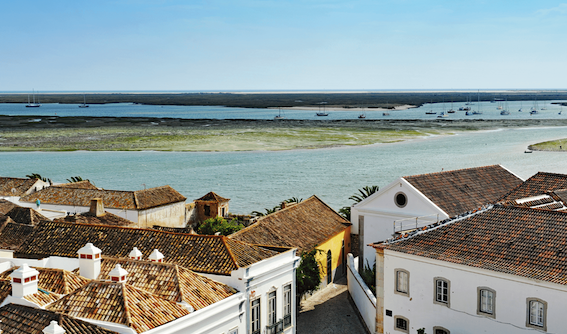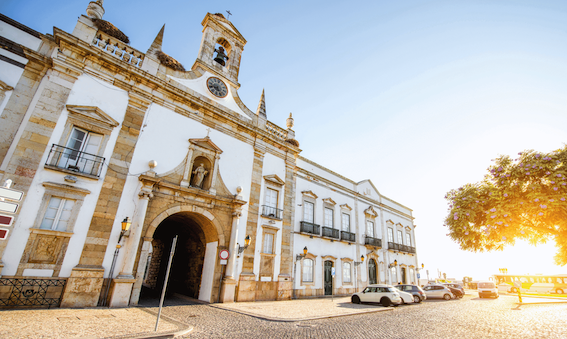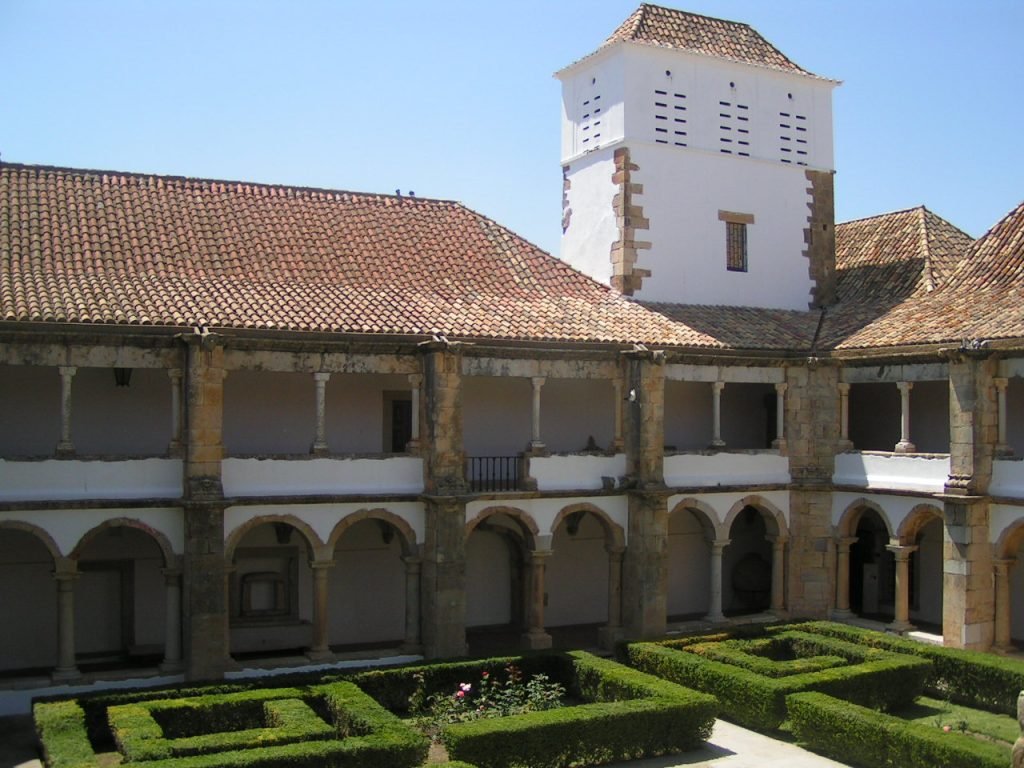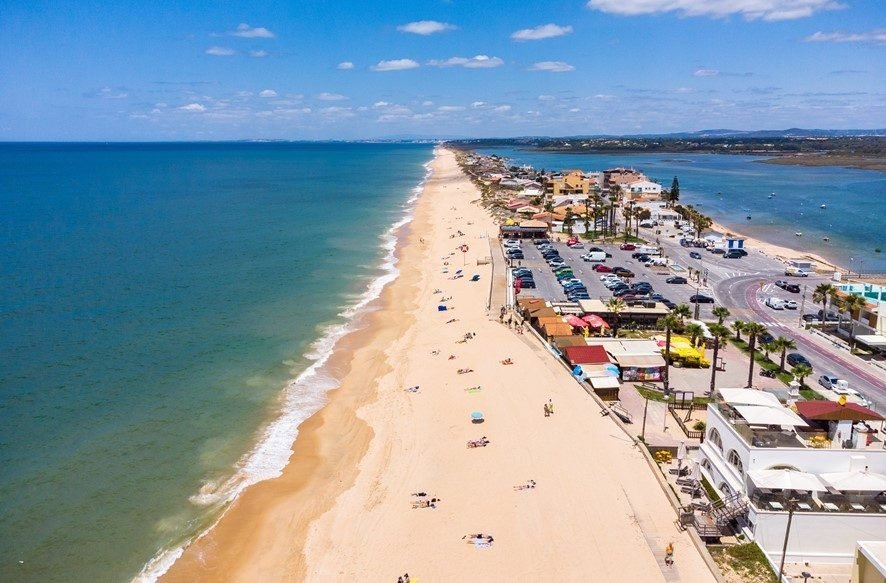Faro


Faro, the capital of Portugal’s sunny Algarve region, offers a vibrant mix of tradition and modernity, making it a popular destination for those looking to live a peaceful life near the sea. Attracting residents and tourists for its natural beauty, cultural heritage and enviable quality of life.
If you are thinking about living in Faro, it is important to consider several aspects such as the cost of living, housing options, job opportunities, the quality of the educational system and the leisure activities available. We have prepared a guide for you, allowing you to make an informed decision about your future in this charming city.
Living in Faro: Advantages and Disadvantages
This city brings a series of advantages such as:
- The Algarve’s mild climate and golden sand beaches are one of Faro’s biggest attractions, offering opportunities to enjoy the sun and sea throughout most of the year.
- Faro is a city rich in history, with a medieval cathedral, a charming old town and museums that reflect the region’s cultural heritage.
- It is an attractive city for those looking for a high quality of life, a relaxed atmosphere, safety and a wide variety of outdoor activities.
- For those who travel frequently, Faro Airport is a significant advantage, offering connections to several European cities.
However, it also has some disadvantages:
- Like the other cities located in the Algarve, Faro, during the summer months, is a very busy city due to the high number of tourists who visit it.
- Due to high tourism, there may be a considerable increase in the cost of living in the summer months.



What to See and Do in Faro?
Vila Adentro
A walk through Vila Adentro is one of the unmissable things to do in Faro. Cobbled streets and alleys, narrow and labyrinthine, lead the visitor through 16th century houses, houses with typical scissor roofs, elegant squares and monumental buildings.

Faro Walls
The entire history of Faro is written on its walls, from its late-Roman foundation to the present. Arches and towers interrupting the walls, originally Moorish, tear through access doors, of which the Arco da Vila and Arco do Repouso stand out, and an undervalued Porta Nova.

Arco da Vila
Tearing apart the Moorish wall since the 11th century, the current neoclassical arch is a must-see on a visit to Faro. The Arab Gate, inside, is the only horseshoe arch in its place of origin in the entire Algarve. The Arco da Vila Interpretive Center is also located inside, dedicated to the history of the city.

Belmarço Palace
As a result of a wealthy bourgeoisie, in the 19th and 20th centuries Faro expanded outside the walls. Nearby are some of the luxurious buildings and residences that reveal those golden times. Examples of this are the Palácio Belmarço and the Consulate General of Brazil in Faro.

Santo António Street
Walk along Rua de Santo António, an open-air shopping center, for the opportunity to enjoy a beautiful Portuguese sidewalk, delight in traditional Algarve sweets sold in pastry shops or learn about the region’s ethnography at the Faro Regional Museum.

Largo da Sé
The look immediately focuses on the Sé Cathedral, or Church of Santa Maria, which is believed to be preceded by a Roman temple and an Arab mosque converted into a church after the Reconquista. According to the taste of each era, Renaissance and Baroque details were added, especially in the interior, and a bell tower that gives us the idea of a fortified structure. Going up to the Tower you will find one of the best panoramic views over the city, the islands and canals of the Ria Formosa.

D. Afonso III Square
Visiting Faro inevitably involves wandering through its squares, and Praça D. Afonso III should be no exception. Centered by the statue of King Dom Afonso III, the city’s tribute to the king who conquered Faro from the Moors in 1249, it is the Convent of Nossa Senhora da Assunção that dominates the attention.

Faro Municipal Museum
The Municipal Museum of Faro has permanent exhibitions of sacred art and archeology. As a bonus, the Renaissance building and rooms, and especially the cloisters of the convent, are of a beauty that justifies the visit.

Downtown Faro
Praça Dom Francisco Gomes is the visiting room of the historic center of Faro, in the city’s downtown. Lined with Portuguese pavement, it is embellished by Jardim Manuel Bivar, with a bandstand and sales stalls, where something always happens. The nerve center of the city’s social and cultural life, is the Faro Marina, the picturesque dock with public art (lit up at night is a must), which attracts the most attention and is the starting point for adventures and boat trips to the Ria Formosa.

Riverside Neighborhood
Former neighborhood of fishermen and large traders, it is in the Bairro Ribeirinho neighborhood that you will find the Maritime Museum, the Church of Nossa Senhora do Carmo, best known for the Capela dos Ossos de Faro attached to it, and the Igreja Matriz de São Pedro, patron saint of sailors.




The Best Beaches in Faro
The beaches in the municipality of Faro are located between the Ancão Peninsula and Culatra Island, in the heart of the Ria Formosa Natural Park, made up of dune barrier islands, salt marshes and inland water channels, which protect the Algarve coast from Atlantic Ocean.
Faro Beach
Located on the Ancão Peninsula, Faro Beach is among the most famous and busiest beaches in the entire municipality of Faro.
Expect to find a beach with a long stretch of sand, ideal for walking and outdoor activities.
There are also good support infrastructures: lifeguards in high season, rental of beach chairs, umbrellas and surfboards, restaurants, cafes and bars right on the sand, as well as mini-markets, good-value accommodation, parking free nearby, among other services.

Barrinha Beach
Barrinha is a spectacle. It has wild characteristics, golden sands and, at low tide, natural pools of warm, crystal-clear waters.
This beach is hidden at the eastern end of the Ancão Peninsula, right in front of Ilha Deserta. Quiet all year round, it is an ideal beach for those who want to spend a peaceful day away from the crowds.
There is no support. So, it’s a good idea to bring a snack, water and an umbrella. Furthermore, it is recommended to visit during low tide. Good bet for couples!

Farol Beach
Bathed by the warm waters of the Ria Formosa, this beach is on the western end of Ilha da Culatra, probably the most famous and busiest island in the Sotavento Algarvio region.
It has an extensive beach, calm and transparent waters, and is home to a traditional fishing village. There are also mini-markets, restaurants and cafes.

Culatra Beach
Opposite the small fishing village of Culatra, more or less in the middle of the island, you will find Praia da Ilha da Culatra-Mar.
This beach has a long strip of sand that extends all the way to Barra Grande, where you can enjoy the inviting natural pools formed at low tide. It’s a good idea to bring a snack, water and an umbrella.

Desert Island Beach
Located on Barreta Island, Praia da Ilha Deserta-Mar faces the Atlantic Ocean. It has a long sandy beach and incredibly crystal clear, blue-green water.
To top it off, the list of services includes the traditional umbrella, chairs, lifeguards during the bathing season, toilet and an (expensive) restaurant nearby. Beach suitable for couples, families, surfers and friends.




Where to live in Faro: Best Places?
The city of Faro offers different places to live, with characteristics adjusted to each person’s preferences and needs. Here we leave you the places that should deserve your best attention:
Historic Center
The historic center of Faro is a place where history, culture and contemporary life merge harmoniously. Every corner tells a story, and each visit reveals new charms of this fascinating city in the heart of the Algarve. Walking through the narrow streets and squares of the center is like taking a trip back in time, visiting monuments, seeing historic buildings and wonderful places.
▪️ Houses for sale in the historic center
▪️ Houses for rent in the historic center
Montenegro and Gambelas
Montenegro and Gambelas are two areas in Faro known for their close connection with the University of Algarve. Located northeast of the city center, these areas are popular with students, teachers and families looking for a more academic and modern atmosphere.
▪️ Houses for sale in Montenegro and Gambelas
▪️ Houses for rent in Montenegro and Gambelas
Faro Island
This island is one of the Algarve's jewels, known for its stunning beaches, unspoilt landscapes and relaxed seaside atmosphere.
It is possible to reach the island via a bridge, which is easy to access from Faro. Despite being an area further away from the city center, Faro Island has basic infrastructure.
▪️ Houses for sale near Faro Island
▪️ Houses for rent near Faro Island



Living in Faro: Cost of Living
The cost of living in Faro is a key factor to consider if you are thinking about moving to this city. This may vary depending on the location and lifestyle you want to have.
Renting an apartment or room in the city center can range from €500 to €800 per month, while outside the center it can be a little more affordable, ranging from €400 to €650.
Food and transport costs are reasonable, with monthly expenses around €200 to €300 for one person, depending on spending habits.
Cell phone plan (calls and mobile internet): +/- €27
Wi-Fi and cable TV channels: +/- €40
Water, gas and electricity: +/- €150
Rice (Kg): €1.18
Black beans (Kg): €1.98
Chicken breast (Kg): €6.10
Picanha from South America (Kg): €23.68
Apples (Kg): €2.06
Bananas (Kg): €1.03
Tomatoes (Kg): €2.07
Onions (Kg): €1.66
Pack of sliced bread (Kg): €2.08
Dozen of eggs: €1.85
Milk (L): €0.85
Water (6L): €0.84
Bottle of regional wine: €4
Extra Virgin Olive Oil (L): €5.27
Bus ticket in the center (bus ticket): €1.20
Monthly bus pass (municipality of Faro): €47.30
Train ticket to Lagos (train ticket): €7.50
Train ticket to Lisbon (train ticket): €22.15
Simple gasoline (95): €1.77/L
Gym membership fee: €45
Cinema ticket: €7.50
Ticket to concerts or theater: €10
Ferry boat to visit the islands: €12.50 (round trip)
Faro Municipal Museum Ticket: €2
Draft beer in a bar downtown (Imperial): €2.50


Living in Faro: City Safety
Security throughout the country is one of its great differences. Portugal was simply elected the seventh safest country in the world according to the Global Peace Index 2023.
In fact, if living in Portugal offers anything, it’s security. Likewise, Faro is an extremely peaceful city for tourists and residents, where it is possible to stay at home or go for a walk in peace.



Living in Faro: Essential Services
Education
▪️ Faro has public and private schools that offer education from pre-school to secondary education. There is a focus on the quality of teaching, providing a solid foundation for students.
▪️ The University of Algarve is an educational landmark in the region. It offers a variety of undergraduate and postgraduate courses, as well as international exchange programs. The university contributes significantly to the academic community and educational development in the region.
Transport
▪️ Faro has a well-developed public transport network, including urban and regional buses. These connect the city to surrounding areas in the Algarve and other cities in the country, facilitating mobility.
▪️ Faro Airport is one of the main entry and exit points in the Algarve, with national and international flights.
Health
▪️ Faro has several health centers and clinics that offer primary medical services. Furthermore, the Faro District Hospital is a reference in providing more specialized and urgent healthcare.



What documents are needed to live in Faro?
Faro follows the same documentation requirements as any Portuguese city.
Tourists staying up to 90 days will be able to stay without a visa. To live in Faro, there are other requirements.